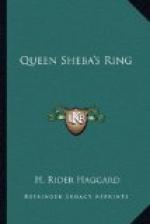“Come,” shouted Joshua, seizing me by the arm, but I drew my dagger on him and he let go. Then he fled with the other lords, and I remained in my high seat beneath the golden canopy alone.
The people fled past me without fighting; they fled into the cave city, they fled to the rocks; they hid themselves among the precipices, and after them came the Fung, slaying and burning, till all Mur went up in flames. And I, I sat and watched, waiting till it was time for me to die also.
At last, I know not how long afterwards, appeared before me Barung, a red sword in his hand, which he lifted to me in salute.
“Greeting, Child of Kings,” he said. “You see Harmac is come to sleep at Mur.”
“Yes,” I answered, “Harmac is come to sleep at Mur, and many of those who dwelt there sleep with him. What of it? Say, Barung, will you kill me, or shall I kill myself?”
“Neither, Child of Kings,” he answered in his high fashion. “Did I not make you a promise yonder in the Pass of Mur, when I spoke with you and the Western men, and does a Fung Sultan break his word? I have taken back the city that was ours, as I swore to do, and purified it with fire,” and he pointed to the raging flames. “Now I will rebuild it, and you shall rule under me.”
“Not so,” I answered; “but in place of that promise I ask of you three things.”
“Name them,” said Barung.
“They are these: First, that you give me a good horse and five days’ food, and let me go where I will. Secondly, that if he still lives you advance one Japhet, a certain Mountaineer who befriended me and brought others to do likewise, to a place of honour under you. Thirdly, that you spare the rest of the Abati people.”
“You shall go whither you desire, and I think I know where you will go,” answered Barung. “Certain spies of mine last night saw four white men riding on fine camels towards Egypt, and reported it to me as I led my army to the secret pass that Harmac showed me, which you Abati could never find. But I said, ’Let them go; it is right that brave men who have been the mock of the Abati should be allowed their freedom.’ Yes, I said this, although one of them was my daughter’s husband, or near to it. But she will have no more of him who fled to his father rather than with her, so it was best that he should go also, since, if I brought him back it must be to his death.”
“Yes,” I answered boldly, “I go after the Western men; I who have done with these Abati. I wish to see new lands.”
“And find an old love who thinks ill of you just now,” he said, stroking his beard. “Well, no wonder, for here has been a marriage feast. Say, what were you about to do, O Child of Kings? Take the fat Joshua to your breast?”
“Nay, Barung, I was about to take this husband to my breast,” and I showed him the knife that was hidden in my marriage robe.
“No,” he said, smiling, “I think the knife was for Joshua first. Still, you are a brave woman who could save the life of him you love at the cost of your own. Yet, bethink you, Child of Kings, for many a generation your mothers have been queens, and under me you may still remain a queen. How will one whose blood has ruled so long endure to serve a Western man in a strange land?”




